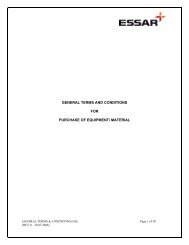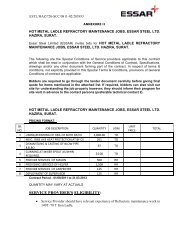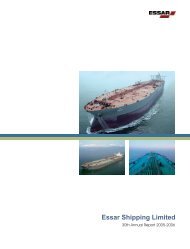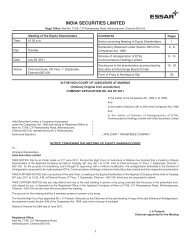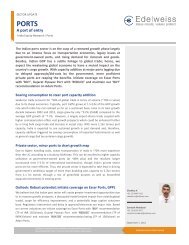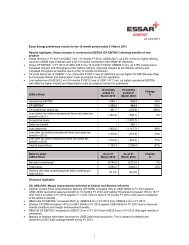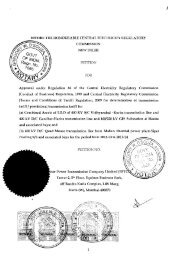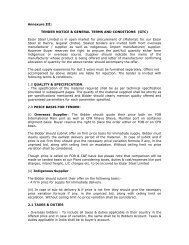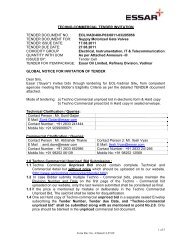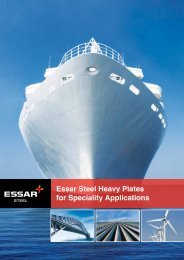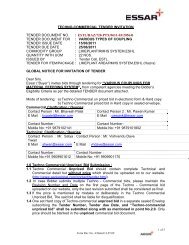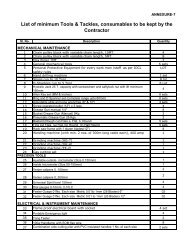Sustainability
Essar Shipping - Sustainability Report 2010-11
Essar Shipping - Sustainability Report 2010-11
- No tags were found...
You also want an ePaper? Increase the reach of your titles
YUMPU automatically turns print PDFs into web optimized ePapers that Google loves.
EnvironmentEnergyShip Energy Efficient Management Plan (SEEMP): In line with current guidelines that have been established by IMO, each of ourvessels will have a vessel specific Energy Efficiency Management Plan. This plan will cover fuel consumption for propulsion,electricity generation and consumption and cargo operations. We plan to capture and monitor the data on a monthly basis so asto take appropriate corrective measures on a timely basis. Onboard performance monitoring systems will give a holisticapproach to ship operations with the aim of reducing fuel consumption and emissions while achieving optimum vesselperformance (Ref IMO- MEPC.1/683). We have already completed energy efficiency evaluation on our ships and are now in theprocess of implementing fuel efficiency measures. These include trim, speed reduction and weather routing. These fuelefficiency measures will not only reduce our energy consumption but also benefit our customers through lower fuel cost, whereapplicable. The outcome of these initiatives will be published in our next report.WaterSea Transportation and Oilfield services mostly use water that is generated on board. The water is withdrawn from deep oceansand is used for operational and other purposes. Logistics only uses water for spraying in the marshalling yard to control dustemissions. No water sources were significantly affected due to withdrawal during the reporting period.Ballast waterBallast water is essential for ships stability and when picked up in one location and discharged in another without controls, thetransported marine organisms can threaten the eco balance and lead to the spread of unwanted species. Our vessels have ballastwater management plans and logs to record the ballast operations and should there be a risk of transporting marine organisms,the vessels perform mid-ocean ballast water exchange. The IMO is in the process of passing regulations to strengthen themeasures required to be taken by vessels to mitigate the risk and we will comply with these measures as when they come intoforce.AirCurrently we are monitoring our emissions as per the IMO Guidelines. As some of our ships were built prior to the introductionof Annex VI, MARPOL, they do not have advanced systems for air pollution control. Our new ships will have state- of- the- art airpollution control equipment.Hazardous wasteSome of the vessels are fitted with an incinerator that can incinerate sludge and waste oil generated. Vessels that do not have anoperational incinerator land the sludge to authorized collection agencies to be handed over to Shore reception facilities. Thedrilling rig also lands all Sludge/Waste oil for disposal to approved shore reception facilities.Disposal of plastics at sea is prohibited. All waste is segregated and plastics are landed to authorized collection agencies Sea3Transportation landed 153 cartridges and treated 52.32 m of garbage.Logistics hands over all used oil from vehicular activity to Essar Steel Secondary sales that then dispose it to authorized treatmentand disposal parties. Logistics also hands over batteries and ink cartridges to the supplier under a buyback policy.BiodiversityOur Logistics operation site does not fall under the area of high biodiversity. However it does fall under protected areas. No IUCNRed list species exist in surrounding area of our operations.Any spill (chemical / oil) over 100 litres is considered as significant as per our company procedures. There was only one significantoil spill during the reporting period. On April 12, 2011, during discharging operation at Gopalpur anchor, a self propelled bargemade contact with MV Malavika in way of FO tank 4S. The contact caused 8 MT of HFO (Heavy fuel oil) to spill into the sea.Temporary repairs were carried out up to satisfaction of Class to make one voyage where the permanent repairs were carried outat next port. The area is environmentally sensitive being the nesting ground for Olive Ridley turtles. On 4th May, 2010 Olive Ridleyturtles commenced hatching and no ill effects of the spill were reported.62



